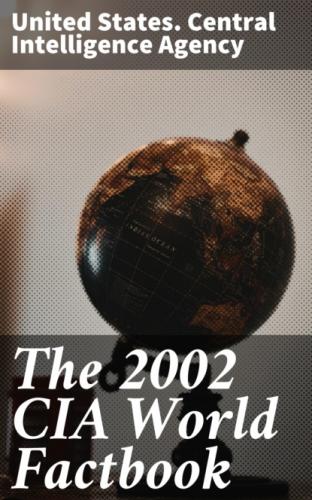Geographic coordinates: 16 00 N, 24 00 W
Map references: Political Map of the World
Area: total: 4,033 sq km water: 0 sq km land: 4,033 sq km
Area - comparative: slightly larger than Rhode Island
Land boundaries: 0 km
Coastline: 965 km
Maritime claims: measured from claimed archipelagic baselines territorial sea: 12 NM exclusive economic zone: 200 NM contiguous zone: 24 NM
Climate: temperate; warm, dry summer; precipitation meager and very erratic
Terrain: steep, rugged, rocky, volcanic
Elevation extremes: lowest point: Atlantic Ocean 0 m highest point:
Mt. Fogo 2,829 m (a volcano on Fogo Island)
Natural resources: salt, basalt rock, limestone, kaolin, fish
Land use: arable land: 10% permanent crops: 0% other: 90% (1998 est.)
Irrigated land: 30 sq km (1998 est.)
Natural hazards: prolonged droughts; seasonal harmattan wind produces obscuring dust; volcanically and seismically active
Environment - current issues: soil erosion; demand for wood used as fuel has resulted in deforestation; desertification; environmental damage has threatened several species of birds and reptiles; illegal beach sand extraction; overfishing
Environment - international agreements: party to: Biodiversity, Climate
Change, Desertification, Environmental Modification, Hazardous Wastes,
Law of the Sea, Marine Dumping, Ozone Layer Protection signed, but not
ratified: none of the selected agreements
Geography - note: strategic location 500 km from west coast of Africa near major north-south sea routes; important communications station; important sea and air refueling site
People Cape Verde
Population: 408,760 (July 2002 est.)
Age structure: 0-14 years: 41.9% (male 86,466; female 84,918) 15-64 years: 51.5% (male 100,684; female 109,841) 65 years and over: 6.6% (male 10,363; female 16,488) (2002 est.)
Population growth rate: 0.85% (2002 est.)
Birth rate: 27.81 births/1,000 population (2002 est.)
Death rate: 7.01 deaths/1,000 population (2002 est.)
Net migration rate: -12.26 migrant(s)/1,000 population (2002 est.)
Sex ratio: at birth: 1.03 male(s)/female under 15 years: 1.02 male(s)/female 15-64 years: 0.92 male(s)/female 65 years and over: 0.63 male(s)/female total population: 0.94 male(s)/female (2002 est.)
Infant mortality rate: 51.86 deaths/1,000 live births (2002 est.)
Life expectancy at birth: 72.91 years (2002 est.) male: Total fertility rate: 3.91 children born/woman (2002 est.)
HIV/AIDS - adult prevalence rate: 0.04% (2001 est.)
HIV/AIDS - people living with HIV/AIDS: 775 (2001)
HIV/AIDS - deaths: 225 (as of 2001)
Nationality: noun: Cape Verdean(s) adjective: Cape Verdean
Ethnic groups: Creole (mulatto) 71%, African 28%, European 1%
Religions: Roman Catholic (infused with indigenous beliefs); Protestant (mostly Church of the Nazarene)
Languages: Portuguese, Crioulo (a blend of Portuguese and West African words)
Literacy: definition: age 15 and over can read and write total population: 71.6% male: 81.4% female: 63.8% (1995 est.)
Government Cape Verde
Country name: Republic of Cape Verde conventional short form:
Cabo Verde
Government type: republic
Capital: Praia
Administrative divisions: 17 districts (concelhos, singular - concelho);
Boa Vista, Brava, Calheta, Maio, Mosteiros, Paul, Praia, Porto Novo,
Ribeira Grande, Sal, Santa Catarina, Santa Cruz, Sao Domingos, Sao
Nicolau, Sao Filipe, Sao Vicente, Tarrafal
Independence: 5 July 1975 (from Portugal)
National holiday: Independence Day, 5 July (1975)
Constitution: new constitution came into force 25 September 1992; underwent a major revision on 23 November 1995, substantially increasing the powers of the president, and a further revision in 1999, to create the position of national ombudsman (Provedor de Justica)
Legal system: derived from the legal system of Portugal
Suffrage: 18 years of age; universal
Executive branch: chief of state: President Pedro PIRES (since 22 March 2001) head of government: Prime Minister Jose Maria Pereira NEVES (since 1 February 2001) cabinet: Council of Ministers appointed by the president on the recommendation of the prime minister elections: president elected by popular vote for a five-year term; election last held 11 and 25 February 2001 (next to be held NA February 2006); prime minister nominated by the National Assembly and appointed by the president election results: 49.43%, Carlos VIEGA (MPD) 49.42%; note - the election was won by only twelve votes
Legislative branch: unicameral National Assembly or Assembleia Nacional (72 seats; members are elected by popular vote to serve five-year terms) elections: last held 14 January 2001 (next to be held NA December 2005) election results: seats by party - PAICV 40, MPD 30, ADM 2
Judicial branch: Supreme Tribunal of Justice or Supremo Tribunal de Justia
Political parties and leaders: African Party for Independence of Cape Verde or PAICV [Jose Maria Pereira NEVES, chairman]; Democratic Alliance for Change or ADM [Dr. Eurico MONTEIRO] (a coalition of PCD, PTS, and UCID); Democratic Christian Party or PDC [Manuel RODRIGUES, chairman]; Democratic Renovation Party or PRD [Jacinto SANTOS, president]; Movement for Democracy or MPD [Agostinho LOPES, president]; Party for Democratic Convergence or PCD [Dr. Eurico MONTEIRO, president]; Party of Work and Solidarity or PTS [Anibal MEDINA, president]; Social Democratic Party or PSD [Joao ALEM, president]
Political pressure groups and leaders: NA
International organization participation: ACCT, ACP, AfDB, CCC, ECA,
ECOWAS, FAO, G-77, IBRD, ICAO, ICFTU, ICRM, IDA, IFAD, IFC, IFRCS,
ILO, IMF, IMO, Interpol, IOC, IOM, IOM (observer), ITU, NAM, OAU,
OPCW (signatory), UN, UNCTAD, UNESCO, UNIDO, UPU, WHO, WIPO, WMO, WTrO
(observer)
Diplomatic representation in the US: chief of mission: Ambassador Jose
BRITO consulate(s) general: Boston FAX: [1] (202) 965-1207 telephone:
[1] (202) 965-6820 chancery: 3415 Massachusetts Avenue NW, Washington,
DC 20007
Diplomatic representation from the US: chief of mission: Ambassador
Michael D. METELITS embassy: Rua Abilio Macedo 81, Praia mailing address:
C. P. 201, Praia telephone: [238] 61 56 16 FAX: [238] 61 13 55
Flag description: three horizontal bands of light blue (top, double width), white (with a horizontal red stripe in the middle third), and light blue; a circle of 10 yellow five-pointed stars is centered on the hoist end of the red stripe and extends into the upper and lower blue bands
Economy Cape Verde
Economy - overview: Cape Verde suffers from a poor natural resource base, including serious water shortages exacerbated by
